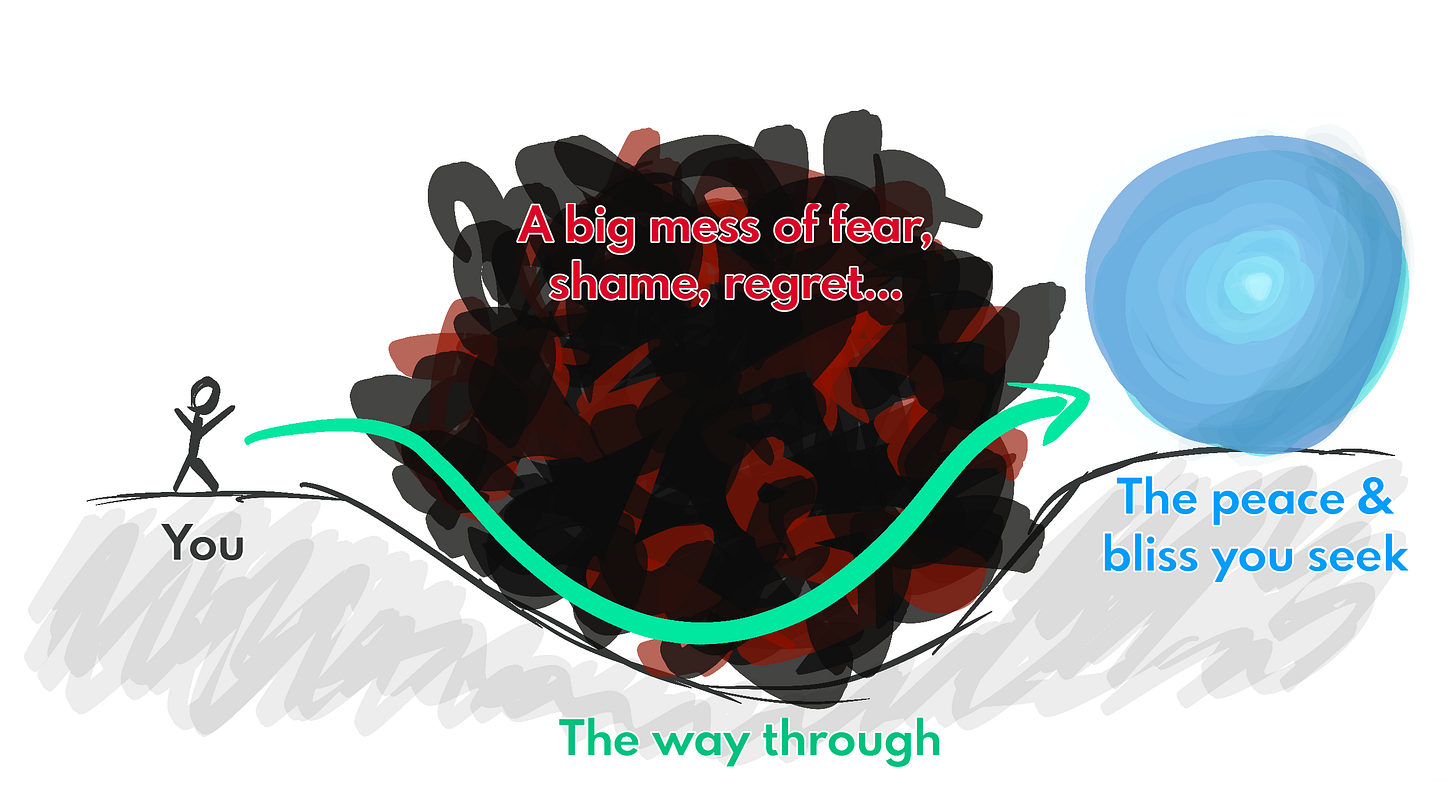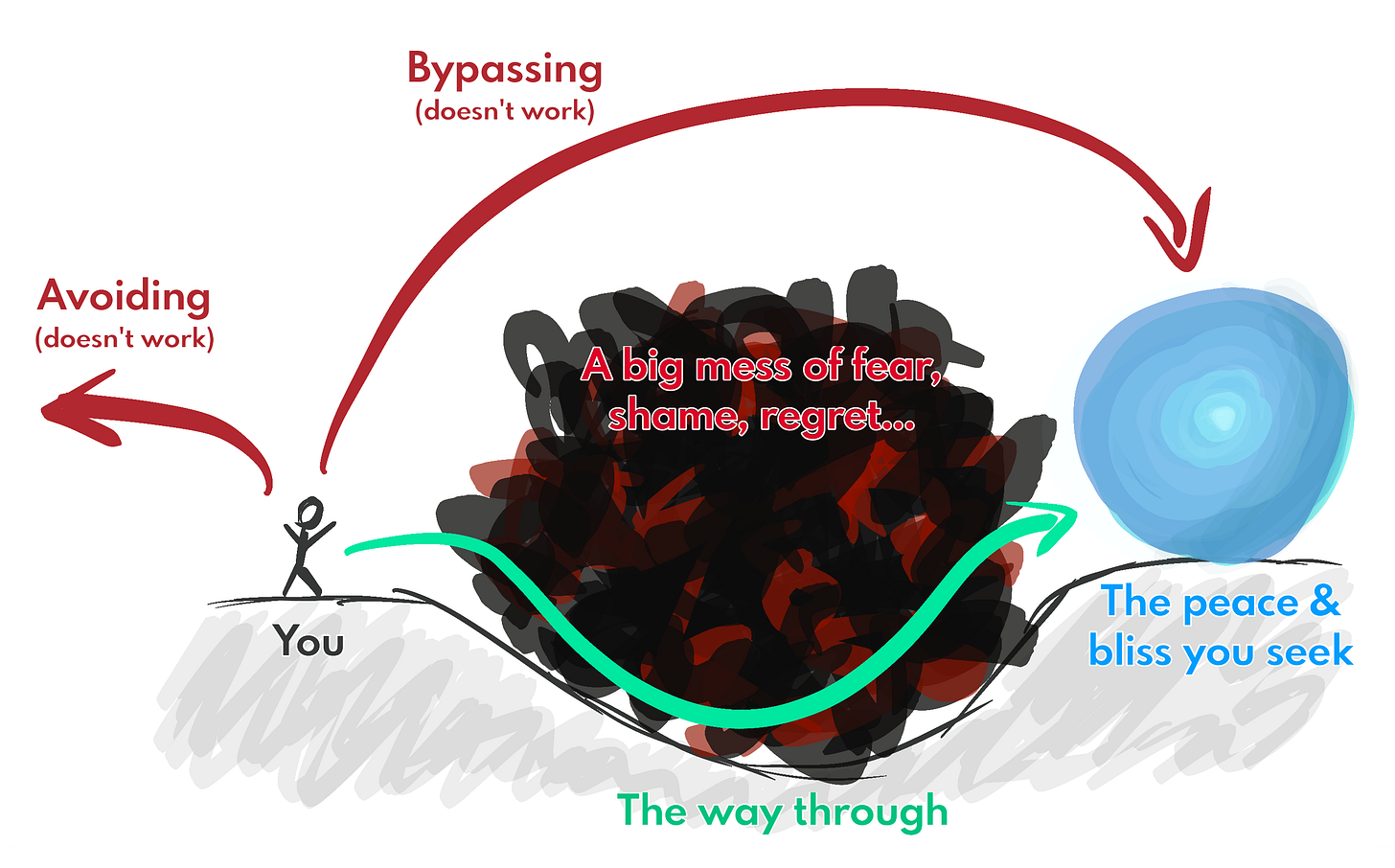What is Shadow Work, Anyway?
An introduction to the only thing that actually leads to personal growth.
Shadow work is when you get to the good thing you want by going through the bad thing you are afraid of and have been trying to avoid.
Shadow work is what has led to the most profound and transformative growth in my own life. And it is what has been most effective for clients and retreat participants I’ve worked with.
Shadow work, as I define it, is not one specific technique or modality. It’s more like an operating principle that can be applied in countless ways.
I didn’t choose the shadow, the shadow chose me.
I was hanging out with a dear group of friends in a somewhat run down community space in Northern Portugal. I had just guided them through a brief shadow work exercise and they asked me how I came to doing this kind of thing.
I told them that it never felt like a choice.
I seem to have an affinity for it. I always end up at shadow work. My speciality seems to be to confront the demons, to enter the dark and scary places, to move through the fear - and to help others do the same.
Which overall, seems a little unpleasant.
I jokingly complained: “Why do I have to be the Shadow Work Guy? Why can’t I be the Orgasm Guy, instead?”
Alas, I’m not the Orgasm Guy. And although I’m sure that would be lots of fun, I have come to recognize the profound value in what I do. It feels like a gift and I want to share it as much as I can.
What works
I’ve been obsessed with personal development for most of my life. I’ll try almost anything once. By now, I’ve probably forgotten about more personal development related techniques and ideas than most people ever learn about.
But I’m also ruthlessly selective, thanks to this idea from one of my childhood heroes, Bruce Lee:
“Absorb what is useful, discard what is useless - and add what is uniquely your own.”
The way I always end up at shadow work is through a process of elimination: I try out loads of stuff (on myself and people I work with) and I eliminate everything that isn’t highly effective.
What I’m left with is almost always some version of this:
To experience growth, you have to pass through the valley of shadows, in one way or another.
The exact details are different from person to person and from situation to situation. But fundamentally, it takes this shape:
There’s something you want more of (more love, more connection, more peace, more joy…) or something you want less of (less conflict, less stress, less drama, less anxiety…).
When you examine this area of your life, loads of “bad” feelings come up: fear, shame, regret, grief, sadness, anger,…
Your impulse is to not go there. To avoid these bad feelings. And there are stories in your mind that justify this decision (“when we went there as a child, this bad thing happened”).
But ultimately, the growh/healing you seek is exactly in the direction you fear the most.
Only once you’ve passed through the thing you’ve been avoiding do you achieve the outcome you were craving at the outset.
This is shadow work. And, as you may have noticed, it’s also a form of the classic hero’s journey.
What doesn’t work
There are two things most people try to do when confronted with the valley of shadows:
One is to avoid the bad feelings by running away from them.
“This way looks scary and unpleasant, let’s quickly turn the other way and find some distraction!”
Honestly, half of capitalism runs on this impulse of ours. You can always find distraction by scrolling through a social feed, chomping down on some doritos, getting inebriated, diving into the escapist fantasy of a video game or movie, vaping cotton candy flavored weed… the choices are endless!
The other avoidance strategy is bypassing. This is where you try to get to the thing on the other side of the valley, but without actually going through the valley.
Come to think of it, perhaps the other half of capitalism runs on this one.
Would you like to therapize, meditate, breathwork, sound heal or positive think your way past the shadows? Or do you prefer the illusion of control provided by joining the 5AM club, having the perfect life dashboard in Notion, and taking an ice bath while downing your carefully calibrated supplement stack?
Some of these avoiding and bypassing things can be helpful in their own right. I’m not saying “don’t do any of that”.
It’s just that the supplements, breathwork techniques etc. (even the ice cream) help you feel better or be healthier while remaining on this side of the valley of shadows.
It may be good for you, but it’s not moving you towards growth.
How to do it
The term “shadow work” originates from Jung’s concept of the shadow: the parts of ourselves we repress and the emotions we fear.
However, that doesn’t mean shadow work = Jungian psychotherapy.
In my personal opinion/experience, there are loads of ways to do shadow work and it’s something anyone can do, with or without a therapist.
Here’s one you can try right away:
Express the shadow in writing
Grab a pen & paper and start writing about something that’s really troubling you. Could be a relationship struggle, money worries, feeling lost and directionless… anything with an emotional charge will do.
Ask yourself: “what am I afraid of? What do I NOT want to think or write about?”
And then allow yourself to express whatever comes up, in writing.
Notice whenever you feel resistance and try gently leaning into it. Allow yourself to express anger, sadness, fear… allow yourself to write inappropriate things.
See what happens if you keep doing this until you get a sense of completion.
Congratulations! You’ve just taken the first few steps into shadow work!
(If you’d like to learn an entire system for shadow work style self-transformation through writing, check out my Introspective Writing Course.)
Somatic/embodied shadow work
What’s your favorite addiction? Maybe it’s an obvious one like nicotine or perhaps it’s one of those “is this even a real addiction?” ones like social media, sugar, romance novels, shopping or porn…
Addictive behavior is a potent entryway into personal growth and here’s how you can try it out:
Start by paying attention to the addictive impulse.
Try to notice it as it happens - that internal tug that makes you reach for your phone, for example. Or something that feels like an itch you need to scratch until you do your addiction thing.
Then, when you catch the impulse, instead of acting on it ask yourself: “where do I feel this in my body?”
Try sitting with your eyes closed and just feeling into your body. Since you’re not following the impulse, something will happen. Probably something unpleasant, like a sensation of mounting urgency.
“We really need to reach for that phone now!”
Instead of giving in, see how long you can continue embracing the mounting unpleasantness (or is it even unpleasant? Keep checking in with your physical sensations to find out).
This is shadow work because you are learning to say yes to the feelings you usually escape. And by tuning into physical sensations, you are moving towards those feelings instead of away from them.
Guided shadow work
Like anything, shadow work is a matter of skill and practice. You can develop the skill by yourself (you might find the free Shadow Workshops in my community useful) or you can find therapists, guides, coaches to help you along the way.
I’ve encountered the principle of shadow work in many different places, under many different names. I believe that almost any good/effective guide or therapist will ultimately have you do this kind of work.
Some examples from my experience include:
Internal Family Systems / Parts Work invites you to examine repressed parts of yourself and gives you a framework for interacting with and integrating them.
Byron Katie’s Work will have you directly verbalizing and then questioning and playing with your worst fears.
A well facilitated plant medicine ceremony is like a hyper dose of shadow work (not for the faint of heart).
Sacred Sons and ISTA are two organizations with which I’ve experienced retreats that were almost entirely about shadow work (caveat: it may come down to the specific facilitator more than the organization).
The method I shared in this post is also a form of shadow work, which you can apply to yourself as well as in relationship with others:
Further reading
If you’d like to explore the topic of shadow work further, here are a few resources I can recommend:
The Way of Integrity by Martha Beck - my favorite read from 2024, this lays out a whole system and way of life. It’s shadow work, although you might not immediately recognize it as that.
Existential Kink by Carolyn Elliott - this is a great book on shadow work, although I fully understand if you hate it. It’s very ultra-spiritual, which is not to everyone’s taste. I respect the author because she’s the only one I’ve found who takes typical woo ideas and actually sees them through to their (very dark, very unsettling) ends.
Authentic Relating by Ryel Kestano - teaches a very specific framework for welcoming another person (and their feelings) without trying to change them. When you do this with difficult feelings, it automatically becomes a form of shadow work.
I’d love to hear if you have favorite resources on the topic to share! Also, what are your experiences with shadow work and what else would you like to learn about it?







Very happy to see another take on shadow work in this space! 🧡 I too think being the orgasm gal would be easier, but alas, I’m the shadow gal.
I also wrote an article on shadow work. We can geek out a bit over our shared interest if you’re up for it.
Forged in Darkness: The Many Paths of Personal Transformation - Dra Joanna Laprade - Changed my perspective on the human experience.